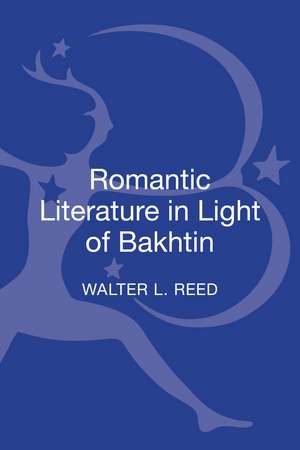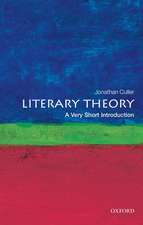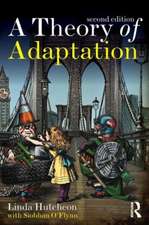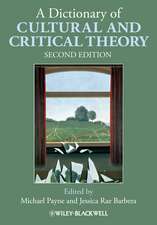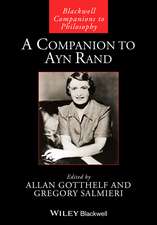Romantic Literature in Light of Bakhtin
Autor Professor Walter L. Reeden Limba Engleză Hardback – 23 apr 2014
| Toate formatele și edițiile | Preț | Express |
|---|---|---|
| Paperback (1) | 235.91 lei 6-8 săpt. | |
| Bloomsbury Publishing – 23 apr 2014 | 235.91 lei 6-8 săpt. | |
| Hardback (1) | 829.82 lei 6-8 săpt. | |
| Bloomsbury Publishing – 23 apr 2014 | 829.82 lei 6-8 săpt. |
Preț: 829.82 lei
Preț vechi: 1064.96 lei
-22% Nou
Puncte Express: 1245
Preț estimativ în valută:
158.86€ • 165.76$ • 133.17£
158.86€ • 165.76$ • 133.17£
Carte tipărită la comandă
Livrare economică 12-26 martie
Preluare comenzi: 021 569.72.76
Specificații
ISBN-13: 9781623563462
ISBN-10: 1623563461
Pagini: 192
Dimensiuni: 140 x 216 x 20 mm
Greutate: 0.39 kg
Ediția:New.
Editura: Bloomsbury Publishing
Colecția Bloomsbury Academic
Locul publicării:New York, United States
ISBN-10: 1623563461
Pagini: 192
Dimensiuni: 140 x 216 x 20 mm
Greutate: 0.39 kg
Ediția:New.
Editura: Bloomsbury Publishing
Colecția Bloomsbury Academic
Locul publicării:New York, United States
Caracteristici
Offers a way of understanding the struggle to define personality in poetry and prose
Notă biografică
Walter L. Reed (Ph.D.Yale) is theWilliam Rand Kenan, Jr. University Professor of English and Comparative Literature in the Graduate Institute of the Liberal Arts atEmory University, USA. Professor Reed has taught literature at Yale, the University of Texas, Austin, and Emory University. His publications include Dialogues of the Word (1993), An Exemplary History of the Novel (1981) Meditations on the Hero: A Study of the Romantic Hero in Nineteenth-Century Fiction (1974).
Cuprins
Introduction: Looking BackChapter One: Possible Persons and the Crisis of Personality Chapter Two: An Architectonics of Romanticism and the Otherness of PersonsChapter Three: Forms of Personhood and Inter-Personality in the Literary Genres of Romanticism Conclusion: Looking AheadBibliographyIndex
Recenzii
This book is full of deep paradoxes that radically refresh our perception of both Mikhail Bakhtin's theories and Romantic aesthetics in their mutual refractions. Bakhtinian approach to English Romanticism allows us to penetrate more deeply into the latter's personalistic and dialogical tenets. Furthermore, Walter Reed prompts us to see Mikhail Bakhtin himself as a disguised Romantic of the third generation whose critique is addressed primarily to traditional adversaries of Romanticism (such as Rationalists and Neoclassicists), but also to the Romantics of the first (early 19 c.) and second (decadents and symbolists of the turn of the 20 c.) generations. Bakhtin's critique of Romanticism is internal critique: of the less radical otherness from the standpoint of the more radical otherness. This book is a must read for all lovers of Romantic poetry and aesthetics.
Readers will come away from this book with a better grasp of Bakhtin's ideas and a pocketful of new perceptions about well-known Romantic poems. More than that, by putting Bakhtin into fruitful dialogue with it, Walter Reed has lit up the whole terrain of English and German Romanticism, not to mention literary theory. And beyond even that, his welcome departure from the prevailing "hermeneutic of suspicion," his generous and assimilative stance, his "poetics of trust," confirms what many of us still believe: that Romanticism was not just an ideological or "aesthetic" delusion but a worldview full of durable insights.
Distracted by carnival and forever allowed a second chance by dialogue, it is easy to forget that those concepts were preceded by an ethical architectonics. Bakhtin's cosmos is founded on the notion that dialogic knowledge is dependent on interactive personalism, Creator-creature relations, and the virtues of trust. In his new book, Walter Reed develops these early Bakhtinian ideas into nothing less than an architectonics of Romanticism: muscular, full of particulars, in which Bakhtin's passion for the fragment is harnessed to a case for Otherness and literary genre becomes the universal binder for creativity. In the early 1920s, while his colleagues in Leningrad were talking Marxism, Bakhtin was holding seminars on his life-long hero, Friedrich Schelling. Reed suggests illuminating reasons why this was so. Both Bakhtin and Romanticism gain in potency and relevance.
The real treasures of Heffernan's book lie in the extraordinary series of readings and close analyses each of its chapters has to offer... For on the whole, this book stands as a great success, and should go a long way in establishing the importance of hospitality within the field of literary studies.
Can one Russian philosopher of communication help us to explain Romantic literature?...Fortunately for this book, Bakhtin is one of the great original thinkers of the past century, and Reed's ambition to coordinate a theorist and a whole period is matched by his caution. Having taught Romantic writers in a comparative context for four decades, and having produced studies of the novel and of Bakhtin, Reed offers a grand scholarly synthesis in a relatively short study.
In the past half-century Mikhail Bakhtin has been read in many ways, but he has yet to be widely accepted as a Romantic or a Romanticist, or at any rate a critic whom one can use to read Romanticism . Walter L. Reed's remarkable new book, Romantic Literature in Light of Bakhtin, prompts us to reconsider this view, and in typically Bakhtinian fashion does so from a position of outsidedness . it firmly establishes the relevance of Bakhtin to discussions of Romanticism and perhaps suggests ways of reading Bakhtin himself in the proper critical spirit, Romantic Literature in Light of Bakhtin should be necessary reading for the respectful and suspicious alike.
Readers will come away from this book with a better grasp of Bakhtin's ideas and a pocketful of new perceptions about well-known Romantic poems. More than that, by putting Bakhtin into fruitful dialogue with it, Walter Reed has lit up the whole terrain of English and German Romanticism, not to mention literary theory. And beyond even that, his welcome departure from the prevailing "hermeneutic of suspicion," his generous and assimilative stance, his "poetics of trust," confirms what many of us still believe: that Romanticism was not just an ideological or "aesthetic" delusion but a worldview full of durable insights.
Distracted by carnival and forever allowed a second chance by dialogue, it is easy to forget that those concepts were preceded by an ethical architectonics. Bakhtin's cosmos is founded on the notion that dialogic knowledge is dependent on interactive personalism, Creator-creature relations, and the virtues of trust. In his new book, Walter Reed develops these early Bakhtinian ideas into nothing less than an architectonics of Romanticism: muscular, full of particulars, in which Bakhtin's passion for the fragment is harnessed to a case for Otherness and literary genre becomes the universal binder for creativity. In the early 1920s, while his colleagues in Leningrad were talking Marxism, Bakhtin was holding seminars on his life-long hero, Friedrich Schelling. Reed suggests illuminating reasons why this was so. Both Bakhtin and Romanticism gain in potency and relevance.
The real treasures of Heffernan's book lie in the extraordinary series of readings and close analyses each of its chapters has to offer... For on the whole, this book stands as a great success, and should go a long way in establishing the importance of hospitality within the field of literary studies.
Can one Russian philosopher of communication help us to explain Romantic literature?...Fortunately for this book, Bakhtin is one of the great original thinkers of the past century, and Reed's ambition to coordinate a theorist and a whole period is matched by his caution. Having taught Romantic writers in a comparative context for four decades, and having produced studies of the novel and of Bakhtin, Reed offers a grand scholarly synthesis in a relatively short study.
In the past half-century Mikhail Bakhtin has been read in many ways, but he has yet to be widely accepted as a Romantic or a Romanticist, or at any rate a critic whom one can use to read Romanticism . Walter L. Reed's remarkable new book, Romantic Literature in Light of Bakhtin, prompts us to reconsider this view, and in typically Bakhtinian fashion does so from a position of outsidedness . it firmly establishes the relevance of Bakhtin to discussions of Romanticism and perhaps suggests ways of reading Bakhtin himself in the proper critical spirit, Romantic Literature in Light of Bakhtin should be necessary reading for the respectful and suspicious alike.
